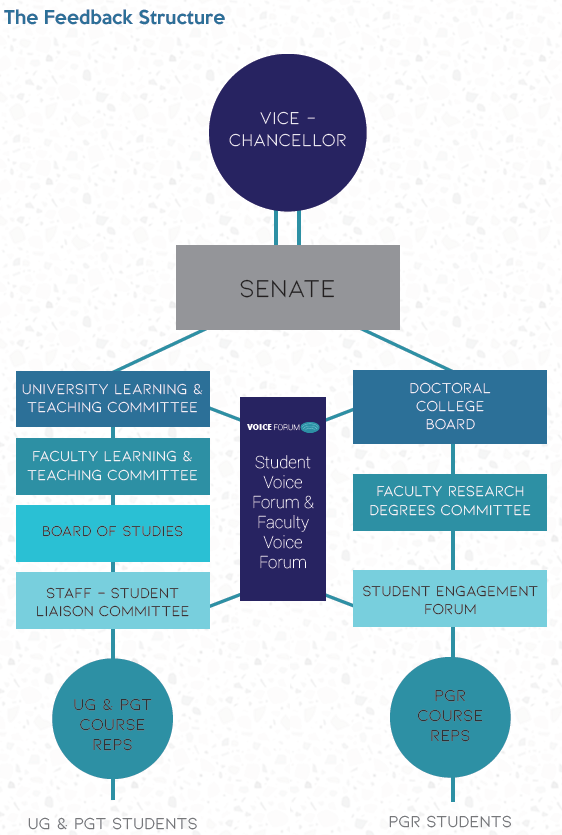We’re now going to focus on how to represent effectively. With a solid foundation of student opinion to support you, and the important skills that we’ll discuss next, you will be an effective Course Rep and a well-respected member of your department.
What makes an effective Rep?
Always bear in mind that finding solutions to student concerns will always be easiest when you have a good working relationship with your department. It’s important to keep your department well-informed of what students think, and when you’re doing this, always keep your feedback practical, professional, and polite! Be self-aware of your intentions when communicating with University staff; you might be mainly interested in the outcomes of your discussions, but it’s important to remember that mutual respect is also hugely important in your role as a link between students and staff.
The University’s Feedback Structure
As a Rep, you’ll be required to attend several different meetings which provide you with opportunities to represent the feedback you’ve gathered from your fellow students.

Click through each item in the following list to read about each meeting you’re required to attend:
University – Staff-Student Liaison Committee (SSLCs)
SSLCs are attended by all Undergraduate and Postgraduate Taught Course Reps and a small number of departmental staff. The point of this meeting is to serve as an informal forum for you to share the student feedback you have gathered with staff. It’s therefore vital that you attend in order to fulfil your core Rep responsibilities.
Before an SSLC, you should make sure you have feedback to discuss, and that you have checked your MySurrey Voice Unitu board for any feedback that hasn’t been completed.
You can usually expect to attend around four SSLCs each year, and the decisions that result from SSLCs will be reported to the Board of Studies.
University – Board of Studies (BoS)
Your Board of Studies is responsible for the academic standard of your course. The membership of the Board will include all Undergraduate and Postgraduate Taught Course Reps from each programme the Board covers, along with Heads of Department and other relevant staff. Although this meeting is more formal than an SSLC, it’s vital that you attend, as this meeting is often where decisions are made.
Before a Board of Studies, you should make sure you have feedback to discuss, and that you have checked your MySurrey Voice Unitu board for any feedback that hasn’t been completed.
University – PGR Engagement Forum
PGR Engagement Forums are attended by all PGR Reps and a small number of Faculty/Doctoral College & Students’ Union staff. The point of this meeting is to serve as an informal forum for you to share the feedback you have gathered with staff, and to discuss key issues and best practice. It’s therefore vital that you attend in order to fulfil your core Rep responsibilities.
You can usually expect to attend around four PGRSEFs each year, and the decisions that result from SSLCs will be reported directly to the FRDC via your SEF Chair, who will also be a PGR Rep.
University – Faculty Research Degrees Committee
The Chair of each Faculty’s Engagement Forum will sit on the FRDC, and will report up what has been discussed. The feedback you bring to your PGRSEF feeds into this committee, and has the opportunity to make a difference, as the FRDC is the decision-making body for issues within your Faculty. Whilst you would only attend this meeting if you also take on the role of Chair, it’s important to know about what this meeting does so you recognise the importance of your attendance at the PGRSEF.
Students’ Union – Student Voice Forum
Student Voice Forum is a chance for all Course Reps across all levels to raise issues brought to you by students which affect the wider student body than just those students on your course. The Union will arrange three SVF events to take place each academic year, and will invite all Course Reps, along with other students in representative positions with the Union, such as Liberation Reps.
The Union will also invite a panel of senior University management staff to answer your questions and address your concerns, so these meetings are a really powerful platform to come together with your fellow Reps to communicate directly with University decision makers on the issues that matter to you.

